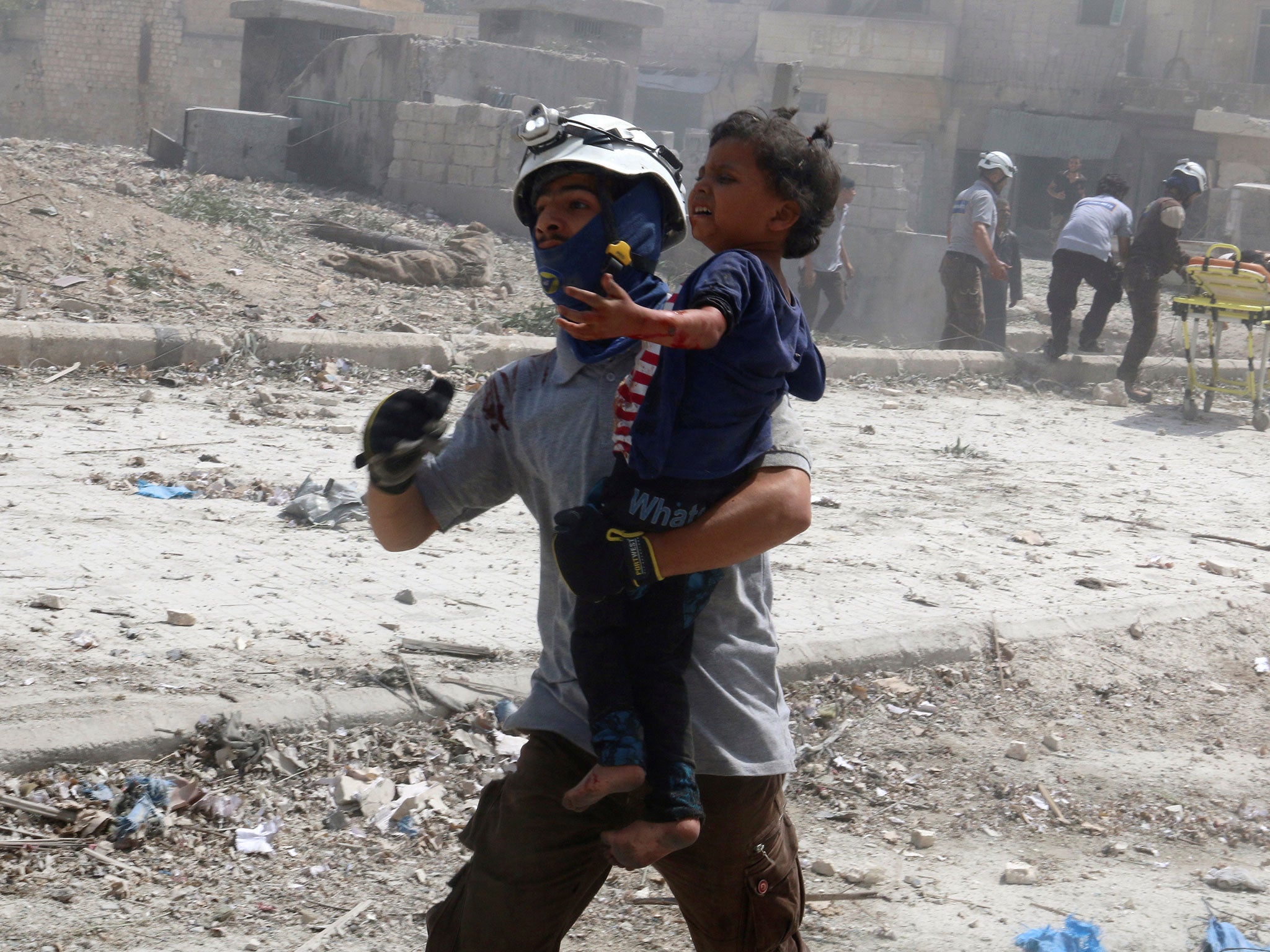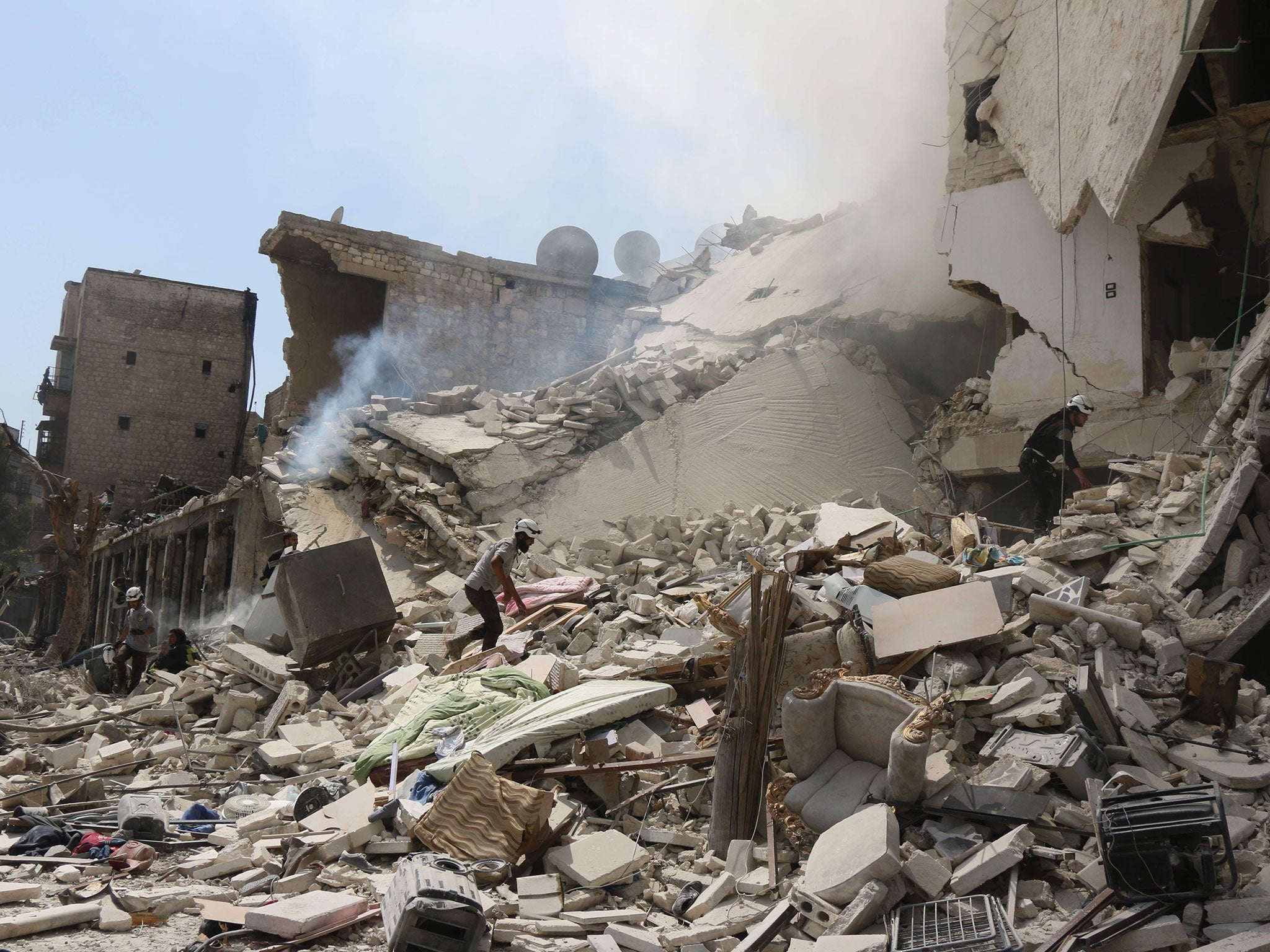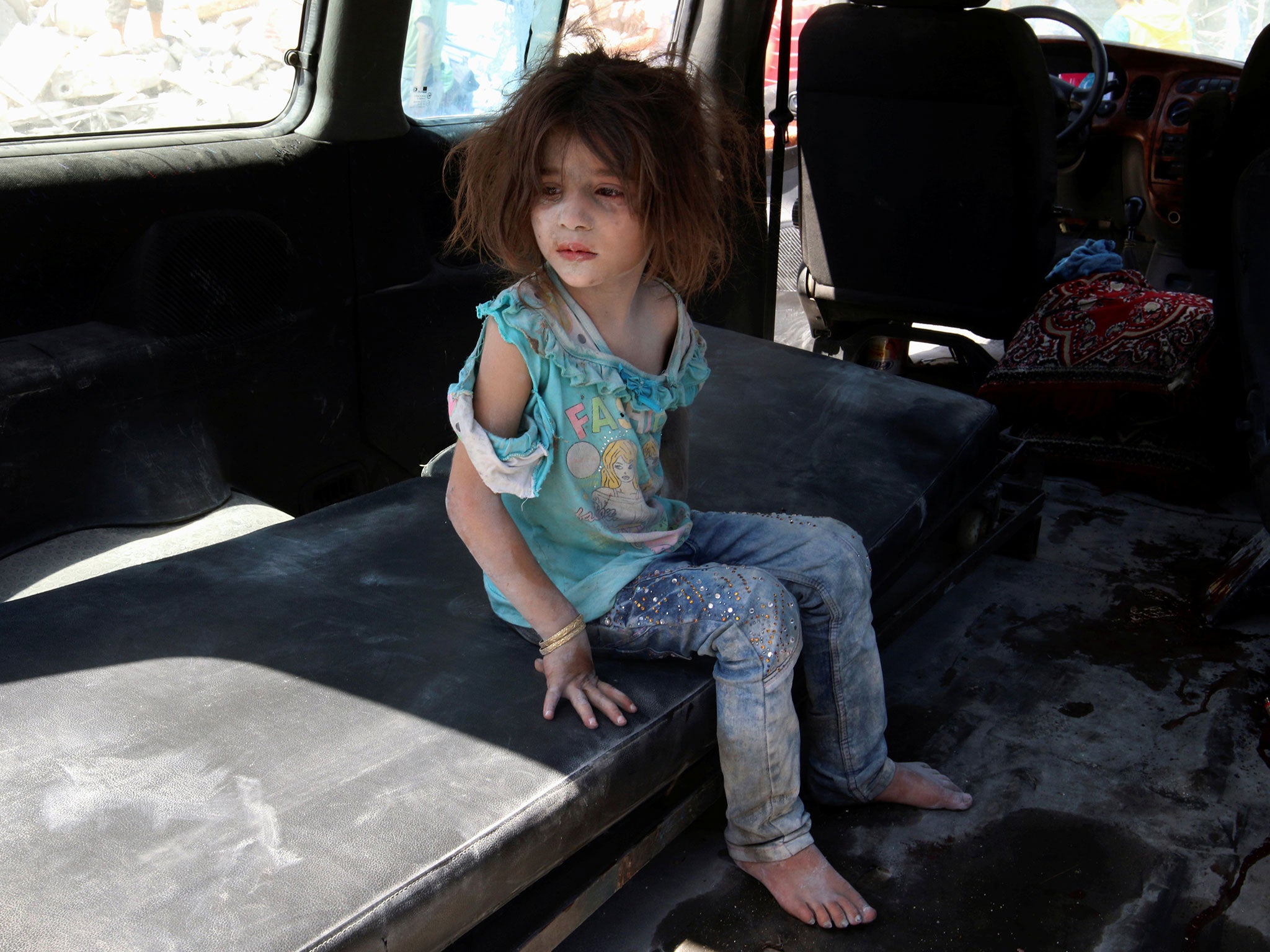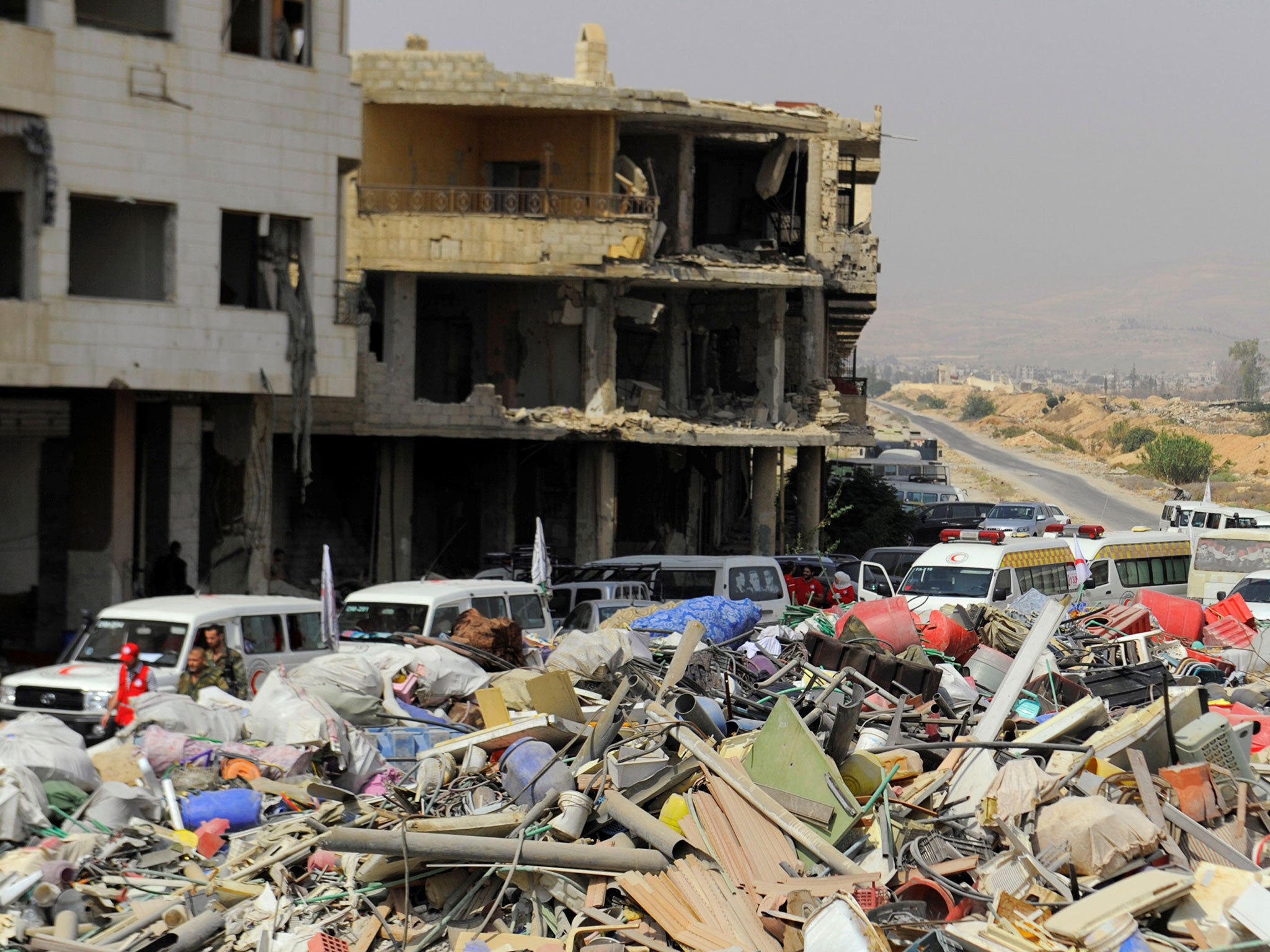Syrian war: At least 15 civilians killed as barrel bombs hit funeral for children killed in air strikes in Aleppo
Rebel-held areas of the Syrian city have suffered intense bombardment in four years of war

At least 15 civilians have reportedly been killed by a suspected barrel bomb attack on a funeral being held in the Syrian city of Aleppo.
Residents had gathered in the rebel-controlled Bab al-Nayrab district to mourn 11 children who died in air strikes two days before on Saturday when the explosions struck.
Mohammed Khandakani, a hospital volunteer, said one of the injured victims told him two barrel bombs were dropped within minutes, injuring an ambulance driver responding to the first attack and hampering rescue efforts.

Footage posted by activists online showed relatives screaming as victims were carried into a side street in body bags, leaving trails of blood on the floor.
A dead body on an abandoned stretcher could be seen next to a partially crushed ambulance, surrounded by rubble and scattered body parts.
A baby was visible among the bodies of the dead as children covered in dust were pulled from the ruins. The images could not be independently verified.
The Syrian Network group put the death toll from Saturday's attacks at 11 but the pro-rebel Aleppo Media Centre said more than 20 people died.
Helicopters flown by forces loyal to Bashar al-Assad were suspected of carrying out the attack, although officials have persistently denied using barrel bombs.
The cheap munitions see containers packed with explosives and shrapnel before being rolled out of helicopters and have were condemned for inflicting indiscriminate casualties in civilian areas by the UN Security Council.

Bab al-Nayrab is in a rebel-controlled part of Aleppo, which is split between opposition and government control.
At least 13 people died in Thursday’s bombing, which destroyed several houses.
In a hospital, footage showed several toddlers and children being treated for wounds, next to crying family members covered in blood.
Aleppo, Syria’s most populous city before the start of the civil war, has been devastated by four years of bombing by both sides.
Both the Assad regime and its Russian backers are accused of killing civilians with air strikes, while rebels have carried out bomb and rocket attacks on residents living in government districts.
Fierce fighting continues between regime troops and a coalition of Islamist militias led by the former al-Qaeda affiliate Jabhat al-Nusra, who are battling to maintain a corridor between opposition areas and the rest of the Aleppo province after rebels broke the siege of the city earlier this month.

Pressure for a lasting ceasefire between all parties in Aleppo has increased following air strikes that injured Omran Daqneesh and killed his brother, with images of the Syrian boy sitting dazed and covered in blood provoking horror around the world.
The United States and Russia held talks on Friday aiming to agree a new cessation of hostilities but did not achieve a resolution.
The US is leading a coalition including Britain and more than a dozen other nations that are targeting Isis with air strikes and backing rebels fighting the terrorist group on the ground.
But Russia, alongside Iran and China, is supporting President Assad and follows the Syrian government’s designation of all opposition groups as “terrorists”.
John Kerry, the US Secretary of State, said he and the Russian foreign minister Sergei Lavrov had established a “path forward” after nine hours of discussion in Geneva.
“We don't want to have a deal for the sake of the deal,” Mr Kerry said. “We want to have something done that is effective and that works for the people of Syria, that makes the region more stable and secure, and that brings us to the table here in Geneva to find a political solution.”
The main focus of talks has been over how to separate opposition groups from jihadists as complex alliances continue to shift.
They were held as rebels and civilians were evacuated from the Damascus suburb of Daraya by regime forces, effectively surrendering it to the government after a gruelling four-year siege.
The UN warned that the “world was watching” as thousands of people were transported in buses to other rebel-controlled areas of Syria, while humanitarian groups expressed concern for their safety.
Sireen, a teacher in Daraya, told Save the Children residents had no choice but to leave their homes, adding: “The old people, the children, the young people, everyone has to leave. It’s a done deal.”
Sonia Khush, the charity’s director for Syria, said civilians must be treated with dignity and respect in the evacuation, which was “not an answer” to sieges across Syria.
“There are concerns for the safety and freedom of movement of civilians who are being transferred into shelters in government-held areas,” she added.

“Mothers are particularly worried for the fate of their teenage sons as they leave Daraya. Families should be allowed to stay together and children in particular need to be protected.”
Tobias Ellwood, the minister for the Middle East, called on the Assad regime and its supporters to ensure their safe passage and “equally protect those who choose to stay” in accordance with international humanitarian law.
“The citizens of Daraya were among the first to hold peaceful protests for a better Syria,” he added.
“They have been besieged for years, enduring terrible suffering under sustained regime airstrikes and cut off from humanitarian aid. We utterly condemn the appalling violence inflicted by the regime on this town.
“The UN must be granted immediate humanitarian access to Daraya and to all others in need in Syria.”
More than 5 million people live in “hard-to-reach” areas of Syria, according to UN figures, including almost 600,000 people (250,000 of them children) living in 18 besieged areas – 15 by the government of Syria or its allies, and three by rebels.
Join our commenting forum
Join thought-provoking conversations, follow other Independent readers and see their replies
Comments